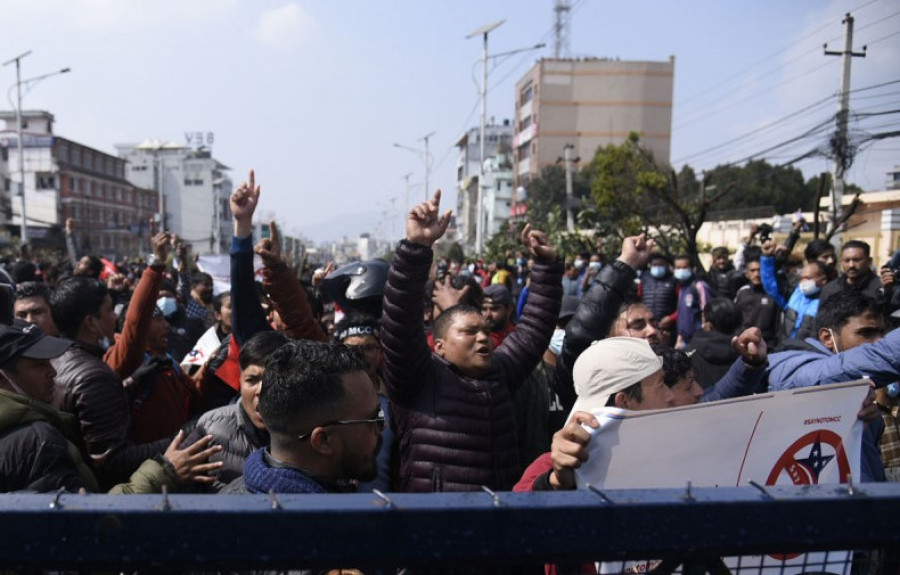Columns
The ideological wasteland of the Nepali communist
It has been extraordinary to witness the prevarication, doublespeak and large-scale mobilisation against the MCC.
Amish Raj Mulmi
"American and British troops will be stationed in Kathmandu. The Americans will take up military command of Nepal. The Americans will construct a road from Raxaul to Tibet for the easy movement of troops and war materials…"
One could easily be mistaken for assuming the above quote is from the virulent wave of propaganda against the MCC by its communist opponents. But, in fact, this is from a CIA summary of an issue of Nepal Fortnightly, a communist journal published from Kolkata, dated December 15, 1949. The communists at the time believed such would be the outcome of the 1950 India-Nepal Treaty, through which "the US has virtually seized the military power of Nepal".
The early communist belief in such outcomes can now be laughed at, but it is ironic that similar allegations continue to be made against the MCC today. The disinformation campaign against the Compact, which the US State Department believes has been “actively fomented or encouraged or funded or facilitated” by China, has reached new heights. Beyond the usual complaint of the Compact superseding Nepal’s constitution, this columnist has personally heard suggestions that the US would turn Nepal into Afghanistan, that American troops will be stationed in the country, and even the possibility of missiles! And among the protestors on Wednesday, some of whom admitted not knowing much about the MCC, a new one emerged: That Nepali women would be unsafe if the MCC comes.
This column does not intend to defend the MCC or American foreign policy. US unilateralism has led to two wars in Afghanistan and Iraq, the latter on dubious grounds, in my lifetime alone. The MCC itself was acknowledged as being part of the Indo-Pacific Strategy (IPS) by none other than a former assistant secretary for South Asia at the US State Department, although the US has also said the treaty predates the IPS and as a non-military treaty, its funds cannot be used for any military purposes. The sharp US response is also an indication that Washington would not like another South Asian country–after Sri Lanka–to reject what it has envisioned as a counter to China’s Belt and Road Initiative.
However, in the four-and-a-half years since the treaty was signed by Nepal, it has been extraordinary to witness the communist prevarication, doublespeak and large-scale mobilisation against the MCC. And now that the deadline is looming near and the US has pretty much told Nepal to take it or leave it (the latter with consequences for larger bilateral ties, specifically regarding development assistance and investments from other countries as well), things have come to a head.
The communist opposition
The leak of Prachanda’s letter in which he asked the MCC, along with Sher Bahadur Deuba, for another "four-five months" to discuss the MCC with party members, "dispel misunderstandings" and "jointly request the Speaker" to table the Compact in Parliament as soon as possible for ratification rightly put him in a spot. Those who are aware of his utterances know that he has rejected the treaty in its current form throughout. There is also the fact that he told the Chinese Communist Party at a virtual interaction in June 2020 that Nepal will not accept any assistance with a security component. And when reports first emerged that Deuba had sent a joint letter assuring the MCC’s ratification, Prachanda said no such claims had been made (although the letter clearly states, "We want to assure you of GoN’s interest in securing the MCC grant and implementing it for the economic development of Nepal.") Now that he finds himself caught in a web of his own making, Maoist cadres have emerged on the streets once again, demanding amendments, although no one is sure what exactly they would like to amend.
The other communist voice leading the charge against the MCC is UML leader Bhim Rawal, for whom the "unequal" treaty has come to represent a threat to Nepal’s sovereignty. A lesser-known opponent is Rastriya Janamorcha chief Chitra Bahadur KC, who once said federalism is a means to "finish off Nepal", for whom the MCC is nothing but an American encirclement of China. Then there is KP Oli, who was in favour while in power but is now sitting on the fence, watching which way the wind will blow.
The opposition against the MCC is supposedly centred around an overall fear of the grant mechanism eroding upon rashtriyata and sarvabhaumta. By such standards, all grants and foreign assistance received by the Nepal government should come under the scanner. But a curious turn of events has limited the opposition to Indian overtures in the past, and now the MCC. Our communists don’t seem to oppose regular military exercises with the US, however, as bothered as they are by the supposed American military presence. Questions haven’t been raised against Chinese loan mechanisms either, or the fact that all grant or loan mechanisms usually employ personnel, equipment or technology from the home countries. No communist government yet has been inclined to reduce foreign aid dependence either.
One may argue the opposition is justified when it’s in the national interest, but the evidence leads us to believe "national interest" is loosely interpreted by our communists. One instance is the establishment of fraternal ties with a foreign communist party and training its cadre in a foreign leader’s ideology. By that measure, should the Rastriya Prajatantra Party formally tie-up with the Bharatiya Janata Party in India, since the ideological goals of the two intersect?
Seeing red
The communist opposition to Americanism is natural and expected. But the US has clearly said the grant received "an incredible amount of positive support" from prime ministers, finance ministers and every "major political party" over the eight administrations since the treaty was signed. The US has also been adamant there can be no amendments, yet the communists do not have the moral certitude to defeat the bill in Parliament, relying instead on street obstructions despite being part of the ruling coalition.
Similarly, the US has also said in no uncertain terms "future assistance and investment decisions" will be "affected" should the grant not be implemented. If the grant is against the national interest as the communists charge, they must have the courage to face whatever comes next as Sri Lanka did, as our baampanthis like to often recall the island-nation’s experience with the grant.
But no, the moral vacuum in Nepal’s contemporary communist movement–one that has already withdrawn from the questions of representation and inclusion they championed at the cost of a civil war–is clearly evident. In the mess the MCC has become, the nation has once again been held hostage. We now find ourselves in an unenviable position where none of our major bilateral partners trusts us. The disappointing bit is, we could see this coming.




 16.88°C Kathmandu
16.88°C Kathmandu















